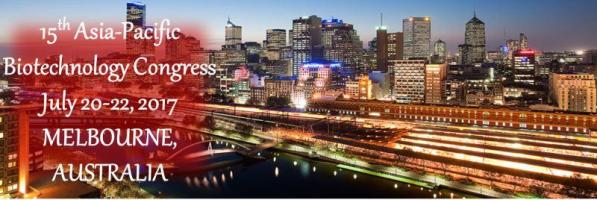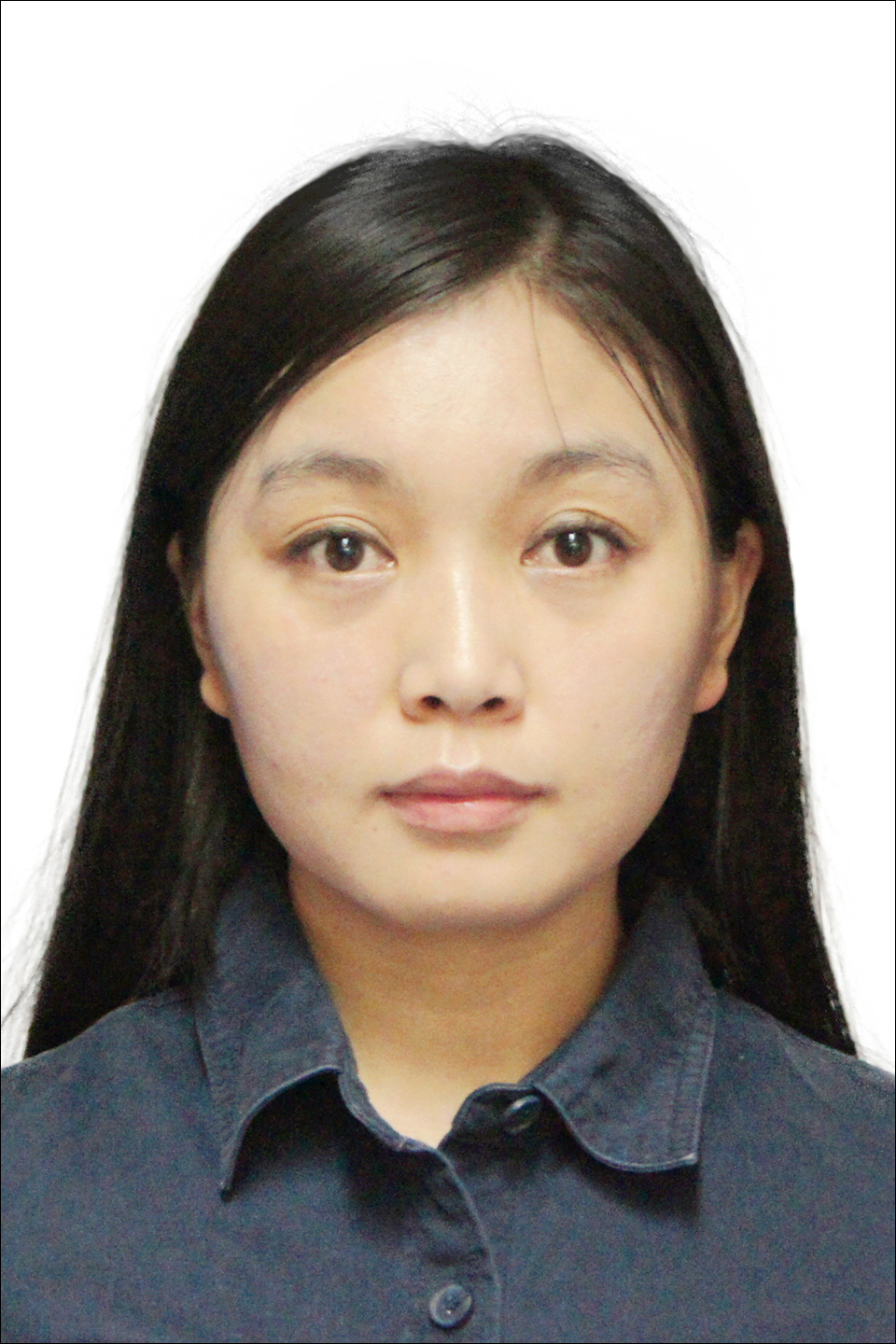Theme: Novel Innovations and Strategies for Sustainable Health
Asia Pacific Biotech Congress 2017
Track 1: Advancements in Biotechnology
Biotechnology is an ever emerging field in which biological processes, organisms, cells and cellular components are exploited to develop novel expertise. Over the past two decades there have been revolutionary biotech innovations which helped the mankind. New tools and products developed by biotechnologists are expedient in research, agriculture, industry and the clinic.
Recent advancements in the field of biotechnology will underpin our economy and provide solutions to intractable problems of human and animal diseases, climate change, fuel alternatives, food security as well as improving our quality of life.
Related Biotechnology Conferences | Biotechnology Meetings | Biotechnology Conventions | biotech marketing conferences | current events in biotechnology
15th World Congress on Biotechnology and Biotech Industries Meet, March 20-22, 2017 at Rome, Italy; Biotechnology 2017, August 21-23, 2017 at Chicago, USA; 17th Euro Biotechnology Congress, September 25-27, 2017 at Berlin, Germany; Global Biotechnology Congress, Oct 9-11, 2017 at Auckland, New Zealand; 15th International Pharmaceutical Microbiology and Biotechnology Conference, June 21-23, 2017 at London, UK; 2nd International Conference on Bioscience and Biotechnology, March 9-10, 2017 at Colombo, Sri Lanka; BIO World Congress on Industrial Biotechnology, July 23-26, 2017 at Montreal, Canada; BioTech 2017, June 13-17 at Prague, Czech Republic; European Federation of Biotechnology; Society for Industrial Microbiology and Biotechnology (SIMB); The Biotech Research Society; Biotechnology and Biological Sciences Research Council (BBSRC); Australia’s Biotechnology Organization (AusBiotech); New Zealand Biotechnology (NZBIO); Biotechnology Innovation Organization (BIO).
Track 2: Agriculture Biotechnology
Agriculture biotechnology or green biotechnology encompasses the use of scientific tools and techniques to understand and transform genetic make-up of living organisms such as plants, animals and microorganisms. The technology offers more precise improvements in crops and livestock and thus increases agricultural productivity. It has greater economic and social impacts as safe and sufficient food supply grown in a responsible method is essential for humanity.
Some of the applications include raising and stabilizing yields using plant breeding; to improve resistance to pests, diseases and abiotic stresses such as drought and cold; and to enrich the nutritional content of foods. Biotechnology is being used to develop low-cost disease-free planting materials for crops such as cassava, banana and potato and is creating new tools for the diagnosis and treatment of plant and animal diseases and for the measurement and conservation of genetic resources.
Related Biotechnology Conferences | Biotechnology Meetings | Biotechnology Conventions | biotech marketing conferences | current events in biotechnology
15th World Congress on Biotechnology and Biotech Industries Meet, March 20-22, 2017 at Rome, Italy; Biotechnology 2017, August 21-23, 2017 at Chicago, USA; 17th Euro Biotechnology Congress, September 25-27, 2017 at Berlin, Germany; Global Biotechnology Congress, Oct 9-11, 2017 at Auckland, New Zealand; 15th International Pharmaceutical Microbiology and Biotechnology Conference, June 21-23, 2017 at London, UK; 2nd International Conference on Bioscience and Biotechnology, March 9-10, 2017 at Colombo, Sri Lanka; BIO World Congress on Industrial Biotechnology, July 23-26, 2017 at Montreal, Canada; BioTech 2017, June 13-17 at Prague, Czech Republic; European Federation of Biotechnology; Society for Industrial Microbiology and Biotechnology (SIMB); The Biotech Research Society; Biotechnology and Biological Sciences Research Council (BBSRC); Australia’s Biotechnology Organization (AusBiotech); New Zealand Biotechnology (NZBIO); Biotechnology Innovation Organization (BIO).
Track 3: Animal Biotechnology
Animal biotechnology is the practice of science and engineering to transform living organisms. Some of the examples include creating transgenic animals, generate specific inactivated gene using gene knockout technology and producing just about identical animals by cloning. It focuses on improving animal health and its welfare and thus increasing its productivity. Selective breeding and genetic engineering aids the animals in providing resistance to diseases and prevent injury.
Animal feeds and feeding practices are being altered by biotechnology to improve animal nutrition and to reduce environmental waste. Biotechnology is used in disease diagnostics and for the production of vaccines against animal diseases.
Related Biotechnology Conferences | Biotechnology Meetings | Biotechnology Conventions | biotech marketing conferences | current events in biotechnology
15th World Congress on Biotechnology and Biotech Industries Meet, March 20-22, 2017 at Rome, Italy; Biotechnology 2017, August 21-23, 2017 at Chicago, USA; 17th Euro Biotechnology Congress, September 25-27, 2017 at Berlin, Germany; Global Biotechnology Congress, Oct 9-11, 2017 at Auckland, New Zealand; 15th International Pharmaceutical Microbiology and Biotechnology Conference, June 21-23, 2017 at London, UK; 2nd International Conference on Bioscience and Biotechnology, March 9-10, 2017 at Colombo, Sri Lanka; BIO World Congress on Industrial Biotechnology, July 23-26, 2017 at Montreal, Canada; BioTech 2017, June 13-17 at Prague, Czech Republic; European Federation of Biotechnology; Society for Industrial Microbiology and Biotechnology (SIMB); The Biotech Research Society; Biotechnology and Biological Sciences Research Council (BBSRC); Australia’s Biotechnology Organization (AusBiotech); New Zealand Biotechnology (NZBIO); Biotechnology Innovation Organization (BIO).
Track 4: Environmental Biotechnology
Environmental biotechnology is a system of science and engineering knowledge used in prevention, treatment and monitoring of environmental pollution through bio-treatment, bio-remediation of polluted environments, and bio-monitoring of environmental and its treatment processes. The process has been shown to play a substantial role in maintaining zero waste agriculture and most significantly through the operation of over 15 million biogas digesters worldwide.
The main application of this system is the biodegradation/detoxication of hazardous substances in industrial waste. Some of the biotechnological agents used include bacteria, algae, fungi and protozoa.
Related Biotechnology Conferences | Biotechnology Meetings | Biotechnology Conventions | biotech marketing conferences | current events in biotechnology
15th World Congress on Biotechnology and Biotech Industries Meet, March 20-22, 2017 at Rome, Italy; Biotechnology 2017, August 21-23, 2017 at Chicago, USA; 17th Euro Biotechnology Congress, September 25-27, 2017 at Berlin, Germany; Global Biotechnology Congress, Oct 9-11, 2017 at Auckland, New Zealand; 15th International Pharmaceutical Microbiology and Biotechnology Conference, June 21-23, 2017 at London, UK; 2nd International Conference on Bioscience and Biotechnology, March 9-10, 2017 at Colombo, Sri Lanka; BIO World Congress on Industrial Biotechnology, July 23-26, 2017 at Montreal, Canada; BioTech 2017, June 13-17 at Prague, Czech Republic; European Federation of Biotechnology; Society for Industrial Microbiology and Biotechnology (SIMB); The Biotech Research Society; Biotechnology and Biological Sciences Research Council (BBSRC); Australia’s Biotechnology Organization (AusBiotech); New Zealand Biotechnology (NZBIO); Biotechnology Innovation Organization (BIO).
Track 5: Food Biotechnology
Biotechnology has an extensive history in food production and processing. Food biotechnology involves the use of various techniques such as genetic engineering to improve productivity in food production and processing. This technology enables to produce new products with desirable characteristics such as leaner meat and nutritional rich foods.
Through newer biotechnology and genetic engineering techniques such as recombinant DNA (rDNA), researchers can move one gene, with the preferred specific traits, from one organism to another and omit the undesirable traits. This facilitates food producers to obtain animal and crop improvements in a much more precise, controlled and predictable manner.
Related Biotechnology Conferences | Biotechnology Meetings | Biotechnology Conventions | biotech marketing conferences | current events in biotechnology
15th World Congress on Biotechnology and Biotech Industries Meet, March 20-22, 2017 at Rome, Italy; Biotechnology 2017, August 21-23, 2017 at Chicago, USA; 17th Euro Biotechnology Congress, September 25-27, 2017 at Berlin, Germany; Global Biotechnology Congress, Oct 9-11, 2017 at Auckland, New Zealand; 15th International Pharmaceutical Microbiology and Biotechnology Conference, June 21-23, 2017 at London, UK; 2nd International Conference on Bioscience and Biotechnology, March 9-10, 2017 at Colombo, Sri Lanka; BIO World Congress on Industrial Biotechnology, July 23-26, 2017 at Montreal, Canada; BioTech 2017, June 13-17 at Prague, Czech Republic; European Federation of Biotechnology; Society for Industrial Microbiology and Biotechnology (SIMB); The Biotech Research Society; Biotechnology and Biological Sciences Research Council (BBSRC); Australia’s Biotechnology Organization (AusBiotech); New Zealand Biotechnology (NZBIO); Biotechnology Innovation Organization (BIO).
Track 6: Industrial and Microbial Biotechnology
Industrial biotechnology, also known as white biotechnology in Europe, is one of the promising approaches that enable in averting pollution, conserve resources and thus cost reduction. The technology uses living cells and components of cells such as enzymes to yield industrially useful products in various sectors such as chemicals, bio-fuels, food etc. Microbial biotechnology implicates the manipulation of microorganisms at the gene and molecular level to yield useful products.
The above said biotechnology procedure enables to use renewable raw materials and can contribute to lowering greenhouse gas emissions and stirring away from a petrochemical-based economy.
Related Biotechnology Conferences | Biotechnology Meetings | Biotechnology Conventions | biotech marketing conferences | current events in biotechnology
15th World Congress on Biotechnology and Biotech Industries Meet, March 20-22, 2017 at Rome, Italy; Biotechnology 2017, August 21-23, 2017 at Chicago, USA; 17th Euro Biotechnology Congress, September 25-27, 2017 at Berlin, Germany; Global Biotechnology Congress, Oct 9-11, 2017 at Auckland, New Zealand; 15th International Pharmaceutical Microbiology and Biotechnology Conference, June 21-23, 2017 at London, UK; 2nd International Conference on Bioscience and Biotechnology, March 9-10, 2017 at Colombo, Sri Lanka; BIO World Congress on Industrial Biotechnology, July 23-26, 2017 at Montreal, Canada; BioTech 2017, June 13-17 at Prague, Czech Republic; European Federation of Biotechnology; Society for Industrial Microbiology and Biotechnology (SIMB); The Biotech Research Society; Biotechnology and Biological Sciences Research Council (BBSRC); Australia’s Biotechnology Organization (AusBiotech); New Zealand Biotechnology (NZBIO); Biotechnology Innovation Organization (BIO).
Track 7: Marine Biotechnology
Marine biotechnology, also called as blue biotechnology, is defined as the application of biotechnology principles in marine resources to derive new cancer treatments for marine organisms. Marine biotechnology has focused largely on marine biomolecules, especially proteins, which may have uses in medicine or engineering. Marine environments are the home to many exotic biological materials that may stimulate biomimetic materials.
Related Biotechnology Conferences | Biotechnology Meetings | Biotechnology Conventions | biotech marketing conferences | current events in biotechnology
15th World Congress on Biotechnology and Biotech Industries Meet, March 20-22, 2017 at Rome, Italy; Biotechnology 2017, August 21-23, 2017 at Chicago, USA; 17th Euro Biotechnology Congress, September 25-27, 2017 at Berlin, Germany; Global Biotechnology Congress, Oct 9-11, 2017 at Auckland, New Zealand; 15th International Pharmaceutical Microbiology and Biotechnology Conference, June 21-23, 2017 at London, UK; 2nd International Conference on Bioscience and Biotechnology, March 9-10, 2017 at Colombo, Sri Lanka; BIO World Congress on Industrial Biotechnology, July 23-26, 2017 at Montreal, Canada; BioTech 2017, June 13-17 at Prague, Czech Republic; European Federation of Biotechnology; Society for Industrial Microbiology and Biotechnology (SIMB); The Biotech Research Society; Biotechnology and Biological Sciences Research Council (BBSRC); Australia’s Biotechnology Organization (AusBiotech); New Zealand Biotechnology (NZBIO); Biotechnology Innovation Organization (BIO).
Track 8: Nano Biotechnology
Application of nanotechnology in biological systems is known as nano-biotechnology. This is a newer technological approach to imagine and create newer systems that can be used for biological research. Biologically inspired nanotechnology uses biological systems as the reference for technologies which have not been created yet.
Nano-biotechnology is assisting modern medicine evolve from treating symptoms to generating cures and regenerating biological tissues. Some of the applications of nano-biotechnology include stem cell treatments, growing uterus outside the body and then placed inside in animals and developing fluorescence polymers.
Related Biotechnology Conferences | Biotechnology Meetings | Biotechnology Conventions | biotech marketing conferences | current events in biotechnology
15th World Congress on Biotechnology and Biotech Industries Meet, March 20-22, 2017 at Rome, Italy; Biotechnology 2017, August 21-23, 2017 at Chicago, USA; 17th Euro Biotechnology Congress, September 25-27, 2017 at Berlin, Germany; Global Biotechnology Congress, Oct 9-11, 2017 at Auckland, New Zealand; 15th International Pharmaceutical Microbiology and Biotechnology Conference, June 21-23, 2017 at London, UK; 2nd International Conference on Bioscience and Biotechnology, March 9-10, 2017 at Colombo, Sri Lanka; BIO World Congress on Industrial Biotechnology, July 23-26, 2017 at Montreal, Canada; BioTech 2017, June 13-17 at Prague, Czech Republic; European Federation of Biotechnology; Society for Industrial Microbiology and Biotechnology (SIMB); The Biotech Research Society; Biotechnology and Biological Sciences Research Council (BBSRC); Australia’s Biotechnology Organization (AusBiotech); New Zealand Biotechnology (NZBIO); Biotechnology Innovation Organization (BIO).
Track 9: Plant Biotechnology
Plant biotechnology applies scientific tools and techniques that accustom plants for precise purposes by cross-breeding, prolonging their growing seasons, adjusting height, color and texture and several other mechanisms. It can also be applied to exchange plant genes to produce novel genetic combinations and superior hybrid species.
Applications of plant biotechnology include biochemical production, rapid clonal multiplication, production of hybrid plants, genetic modification in plants etc.
Related: Biotechnology Conferences | Biotechnology Meetings | Biotechnology Conventions | biotech marketing conferences | current events in biotechnology
15th World Congress on Biotechnology and Biotech Industries Meet, March 20-22, 2017 at Rome, Italy; Biotechnology 2017, August 21-23, 2017 at Chicago, USA; 17th Euro Biotechnology Congress, September 25-27, 2017 at Berlin, Germany; Global Biotechnology Congress, Oct 9-11, 2017 at Auckland, New Zealand; 15th International Pharmaceutical Microbiology and Biotechnology Conference, June 21-23, 2017 at London, UK; 2nd International Conference on Bioscience and Biotechnology, March 9-10, 2017 at Colombo, Sri Lanka; BIO World Congress on Industrial Biotechnology, July 23-26, 2017 at Montreal, Canada; BioTech 2017, June 13-17 at Prague, Czech Republic; European Federation of Biotechnology; Society for Industrial Microbiology and Biotechnology (SIMB); The Biotech Research Society; Biotechnology and Biological Sciences Research Council (BBSRC); Australia’s Biotechnology Organization (AusBiotech); New Zealand Biotechnology (NZBIO); Biotechnology Innovation Organization (BIO).
Track 10: Medical Biotechnology
Medical biotechnology, also called as red biotechnology, involves the use of living cells and cell materials to create pharmaceutical and diagnostic products which helps to treat and prevent human diseases. The principles of medical biotechnology are applied in pharmacology, gene therapy, stem cells and tissue engineering.
The application of biotechnology to basic science has empowered wider knowledge and understanding of biology. As a result of our development in scientific knowledge of normal and disease biology, we could able to develop newer medicines to treat previously untreatable diseases.
Related Biotechnology Conferences | Biotechnology Meetings | Biotechnology Conventions | biotech marketing conferences | current events in biotechnology
15th World Congress on Biotechnology and Biotech Industries Meet, March 20-22, 2017 at Rome, Italy; Biotechnology 2017, August 21-23, 2017 at Chicago, USA; 17th Euro Biotechnology Congress, September 25-27, 2017 at Berlin, Germany; Global Biotechnology Congress, Oct 9-11, 2017 at Auckland, New Zealand; 15th International Pharmaceutical Microbiology and Biotechnology Conference, June 21-23, 2017 at London, UK; 2nd International Conference on Bioscience and Biotechnology, March 9-10, 2017 at Colombo, Sri Lanka; BIO World Congress on Industrial Biotechnology, July 23-26, 2017 at Montreal, Canada; BioTech 2017, June 13-17 at Prague, Czech Republic; European Federation of Biotechnology; Society for Industrial Microbiology and Biotechnology (SIMB); The Biotech Research Society; Biotechnology and Biological Sciences Research Council (BBSRC); Australia’s Biotechnology Organization (AusBiotech); New Zealand Biotechnology (NZBIO); Biotechnology Innovation Organization (BIO).
Track 11: Pharmaceutical Biotechnology
Pharmaceutical biotechnology involves the application of principles of biotechnology in the development of drugs. Techniques such as recombinant DNA are used to design more effective drugs. Biotechnology has added to the discovery and manufacturing of traditional small molecule pharmaceutical drugs as well as drugs. Modern biotechnology allows manufacturing existing medicines relatively easy and less economical.
Modern biotechnology facilitates its use in pharmaceutical drug discovery, production and development, pharmacogenomics and genetic screening.
Related Biotechnology Conferences | Biotechnology Meetings | Biotechnology Conventions | biotech marketing conferences | current events in biotechnology
15th World Congress on Biotechnology and Biotech Industries Meet, March 20-22, 2017 at Rome, Italy; Biotechnology 2017, August 21-23, 2017 at Chicago, USA; 17th Euro Biotechnology Congress, September 25-27, 2017 at Berlin, Germany; Global Biotechnology Congress, Oct 9-11, 2017 at Auckland, New Zealand; 15th International Pharmaceutical Microbiology and Biotechnology Conference, June 21-23, 2017 at London, UK; 2nd International Conference on Bioscience and Biotechnology, March 9-10, 2017 at Colombo, Sri Lanka; BIO World Congress on Industrial Biotechnology, July 23-26, 2017 at Montreal, Canada; BioTech 2017, June 13-17 at Prague, Czech Republic; European Federation of Biotechnology; Society for Industrial Microbiology and Biotechnology (SIMB); The Biotech Research Society; Biotechnology and Biological Sciences Research Council (BBSRC); Australia’s Biotechnology Organization (AusBiotech); New Zealand Biotechnology (NZBIO); Biotechnology Innovation Organization (BIO).
Track 12: Bioengineering and Biotechnology
Bioengineering refers to the usage of molecular biology to study advance applications and to create biotechnology. It extends to the creation of artificial organs and develops genetically modified organisms. It employs knowledge from pure and applied sciences such as mass and heat transfer, kinetics, biocatalysts, biomechanics, bioinformatics etc.
Bioengineering is applied in the design of medical devices, diagnostic equipment, biocompatible materials, renewable bioenergy and other areas that progress the living standards of societies.
Related Biotechnology Conferences | Biotechnology Meetings | Biotechnology Conventions | biotech marketing conferences | current events in biotechnology
15th World Congress on Biotechnology and Biotech Industries Meet, March 20-22, 2017 at Rome, Italy; Biotechnology 2017, August 21-23, 2017 at Chicago, USA; 17th Euro Biotechnology Congress, September 25-27, 2017 at Berlin, Germany; Global Biotechnology Congress, Oct 9-11, 2017 at Auckland, New Zealand; 15th International Pharmaceutical Microbiology and Biotechnology Conference, June 21-23, 2017 at London, UK; 2nd International Conference on Bioscience and Biotechnology, March 9-10, 2017 at Colombo, Sri Lanka; BIO World Congress on Industrial Biotechnology, July 23-26, 2017 at Montreal, Canada; BioTech 2017, June 13-17 at Prague, Czech Republic; European Federation of Biotechnology; Society for Industrial Microbiology and Biotechnology (SIMB); The Biotech Research Society; Biotechnology and Biological Sciences Research Council (BBSRC); Australia’s Biotechnology Organization (AusBiotech); New Zealand Biotechnology (NZBIO); Biotechnology Innovation Organization (BIO).
Track 13: Bio-products and Bioenergy
Bio-products are biologically derived products such as chemicals, materials and energy from renewable resources. There are two types of bio-products namely conventional bio-products and emerging bio-products. Examples of conventional bio-products are pulp and paper, building materials and forest products whereas emerging bio-products include bioenergy, biofuels, bio-chemicals, bio-plastics etc.
Bioenergy is a renewable energy from materials derived from biological resources. It is a single largest renewable energy source providing 10% of world’s primary energy supply.
Related Biotechnology Conferences | Biotechnology Meetings | Biotechnology Conventions | biotech marketing conferences | current events in biotechnology
15th World Congress on Biotechnology and Biotech Industries Meet, March 20-22, 2017 at Rome, Italy; Biotechnology 2017, August 21-23, 2017 at Chicago, USA; 17th Euro Biotechnology Congress, September 25-27, 2017 at Berlin, Germany; Global Biotechnology Congress, Oct 9-11, 2017 at Auckland, New Zealand; 15th International Pharmaceutical Microbiology and Biotechnology Conference, June 21-23, 2017 at London, UK; 2nd International Conference on Bioscience and Biotechnology, March 9-10, 2017 at Colombo, Sri Lanka; BIO World Congress on Industrial Biotechnology, July 23-26, 2017 at Montreal, Canada; BioTech 2017, June 13-17 at Prague, Czech Republic; European Federation of Biotechnology; Society for Industrial Microbiology and Biotechnology (SIMB); The Biotech Research Society; Biotechnology and Biological Sciences Research Council (BBSRC); Australia’s Biotechnology Organization (AusBiotech); New Zealand Biotechnology (NZBIO); Biotechnology Innovation Organization (BIO).
Track 14: Bioinformatics
Bioinformatics is a branch of biotechnology that involves use of computer applications such as applied math and statistics to analyze and interpret biological data. It helps in organizing the large-scale information and analysis of biological queries using mathematical and statistical techniques. It is used in the identification of candidate genes and nucleotides which helps in better understanding of genetic basis of disease and its properties.
Bioinformatics is useful in areas such as functional genomics, structural genomics, and proteomics, and acts as a key constituent in the biotechnology and pharmaceutical sector.
Related Biotechnology Conferences | Biotechnology Meetings | Biotechnology Conventions | biotech marketing conferences | current events in biotechnology
15th World Congress on Biotechnology and Biotech Industries Meet, March 20-22, 2017 at Rome, Italy; Biotechnology 2017, August 21-23, 2017 at Chicago, USA; 17th Euro Biotechnology Congress, September 25-27, 2017 at Berlin, Germany; Global Biotechnology Congress, Oct 9-11, 2017 at Auckland, New Zealand; 15th International Pharmaceutical Microbiology and Biotechnology Conference, June 21-23, 2017 at London, UK; 2nd International Conference on Bioscience and Biotechnology, March 9-10, 2017 at Colombo, Sri Lanka; BIO World Congress on Industrial Biotechnology, July 23-26, 2017 at Montreal, Canada; BioTech 2017, June 13-17 at Prague, Czech Republic; European Federation of Biotechnology; Society for Industrial Microbiology and Biotechnology (SIMB); The Biotech Research Society; Biotechnology and Biological Sciences Research Council (BBSRC); Australia’s Biotechnology Organization (AusBiotech); New Zealand Biotechnology (NZBIO); Biotechnology Innovation Organization (BIO).
Track 15: Biotech Industry
Biotechnology industry harnesses cellular and bio-molecular processes to develop technologies and products that help improve our lives and the health of our planet. Modern biotechnology provides breakthrough products and technologies to combat incapacitating and infrequent diseases, reduce our environmental footprint, feed the hungry, use less energy, and have safer, cleaner and more efficient industrial manufacturing processes.
The biotech industry broadly segments into the medical and agricultural markets. Although enterprising biotechnology is also being applied to other exciting areas like industrial production of chemicals, and bioremediation, the use in these areas is still specialized and limited. Biotechnology introduced a whole new approach to drug development that did not easily integrate into the chemically-focused approach most of the established pharmaceutical companies were using.
Related Biotechnology Conferences | Biotechnology Meetings | Biotechnology Conventions | biotech marketing conferences | current events in biotechnology
15th World Congress on Biotechnology and Biotech Industries Meet, March 20-22, 2017 at Rome, Italy; Biotechnology 2017, August 21-23, 2017 at Chicago, USA; 17th Euro Biotechnology Congress, September 25-27, 2017 at Berlin, Germany; Global Biotechnology Congress, Oct 9-11, 2017 at Auckland, New Zealand; 15th International Pharmaceutical Microbiology and Biotechnology Conference, June 21-23, 2017 at London, UK; 2nd International Conference on Bioscience and Biotechnology, March 9-10, 2017 at Colombo, Sri Lanka; BIO World Congress on Industrial Biotechnology, July 23-26, 2017 at Montreal, Canada; BioTech 2017, June 13-17 at Prague, Czech Republic; European Federation of Biotechnology; Society for Industrial Microbiology and Biotechnology (SIMB); The Biotech Research Society; Biotechnology and Biological Sciences Research Council (BBSRC); Australia’s Biotechnology Organization (AusBiotech); New Zealand Biotechnology (NZBIO); Biotechnology Innovation Organization (BIO).
Conferences Series LLC invites the participants across the world to attend its upcoming 15th Asia-Pacific Biotechnology Congress which is scheduled during July 20-22, 2017 Melbourne, Australia with the theme “Novel innovations and strategies for sustainable health’’. This international convention provides a unique platform for all the young researchers and students to present their research. 15th Asia-Pacific Biotechnology Congress, 2017 includes prompt keynote presentations, Oral talks, Poster presentations and Exhibitions. On behalf of the organizing committee of 15th Asia-Pacific Biotechnology Congress 2017, we warmly welcome all the leading Scientists, Researchers and Scholars to attend and share their expertise in the unique platform scheduled in the beautiful city of Melbourne.
Conferences Series LLC organizes a conference series of 3000+ Global Events inclusive of 1000+ Conferences, 1000+ Upcoming and Previous Symposiums and Workshops in USA, Europe & Asia with support from 1000 more scientific societies and publishes 700+ Open access journals which contain over 30000 eminent personalities, reputed scientists as editorial board members.
Why to Attend?
This unique international conference provides a platform for researchers and decision makers in biotechnology to present and exchange their latest findings from all over the world and learn about all the important developments in field of biotechnology. The conference will cover the novel strategies and translational nature of biotechnological research, with emphasis on both the basic science as well as its applications in industry and academia. Throughout the course of the three day conference, you will have the opportunity to both network and hear world renowned speakers from the international academic and corporate biotechnology communities. This is an exciting opportunity to showcase the new technology, the new products of your company, and/or the service your industry may offer to a broad international audience. It covers a wide range of topics including advancements in biotechnology, pharmaceutical biotechnology, medical biotechnology, industrial biotechnology, agriculture biotechnology, environmental biotechnology, bio products and bioenergy.
Why Melbourne?
Melbourne is the capital and most populous city of the Australian state of Victoria, and the second-most populous city in Australia. Melbourne is a stylish and arty city that’s both dynamic and cosmopolitan, and proud of its place as Australia’s cultural capital. Its stately gold rush–era architecture and a multicultural make-up reflect the city’s recent history, while edgy street art, top museums and sticky-carpeted band venues point to its present-day personality. Melbourne has a temperate oceanic climate and is well known for its changeable weather conditions. The average temperature is between 11.40C (min) and 20.40C (max). Melbourne has an integrated public transport system based around extensive train, tram, bus and taxi systems. Melbourne has four airports. Melbourne Airport, at Tullamarine, is the city's main international and domestic gateway and second busiest in Australia.
Target Audience:
Academicians
Scientists
Researchers
Young Scientists
Entrepreneurs
Business Delegates
Students
Scope and Importance of Biotechnology
Biotechnology is a field of applied biology that involves the use of living organisms and bioprocesses in engineering, medicine, technology and other fields requiring bio-products. Modern use similar term includes genetic engineering as well as cell and tissue culture technologies. It is the integrated use of molecular biology, biochemistry and microbiology to achieve technological application of the capabilities of biological agents. Biotechnology is emerged as a science with immense potential for human welfare ranging from food processing, human health to environment protection. The field of biotechnology is constantly advancing. From finding ways to slow down the process of food spoilage, advancements in genetic engineering, to adapting organisms to clean up contaminated environments, new applications and biotechnological inventions are continuously being developed to help improve our world.
Modern biotechnology applies not only modern genetics but also advances in other sciences. However, there is a third revolution that is just emerging, which is nanotechnology. The development of techniques to visualize and manipulate atoms individually or in small clusters is opening the way to an ever-finer analysis of living systems. Nano-scale techniques are now beginning to play substantial role in the application of biotechnology.
World renowned experts and intellectuals agree that biotechnological innovation is the foundation-stone of our future, and a ‘game changer’. It is anticipated that it will underpin our economy and provide solutions to intractable problems of human and animal diseases, climate change, fuel alternatives, food security as well as improving our quality of life.
Biotechnology in Australia
The Australian biotechnology industry is one of the largest in the world. Despite the challenges of the global economy and the degree of difficulty in building a biotechnology and life sciences sector from scratch, Australia is doing very well by any comparative measure, with an impressive return on investment from a maturing stock of quality companies. Australian biotechnology boasts a raft of success stories and a world-class industry. Since its emergence in the early to mid-nineties, the biotechnology industry in Australia has achieved a great deal.
Australia’s comparative advantage comes from its world-class science and medical research, its capacity for international partnerships, cost effectiveness, and a transparent and effective regulatory system. Jobs of the future will be found in the biotech and pharmaceuticals sector, and the medical technology sector. In addition, there are many thousands of direct jobs in the agricultural and industrial biotechnology sectors and indirect jobs in dependent areas such as clinical trial teams, high-tech manufacturing, medical research and supplies to the medical technology sector and in services such as those provided by patent attorneys. Innovative industries provide high-skilled jobs with long-term prospects.
The Research & Development (R&D) Tax Incentive has been a long-established source of funding and support for businesses in the research, development and early developmental commercialization phases. The policy driver behind the R&D Tax Incentive is to encourage more companies to engage in R&D in Australia. And it’s working: a number of companies have publically stated that they have set up in Australia because of the support provided by the R&D Tax Incentive.
Australian state governments are developing and implementing independent regional initiatives. Each has strong medical research programs, some having specialist expertise in areas including tropical medicine, bio-discovery, regenerative medicine, bioremediation, agricultural/industrial biotech and medical devices. Australian life sciences companies have attracted well over $2 billion in deal flow over the last 18 months. Global recognition of the sector’s quality was reflected in major deals, including Novartis’ acquisition of Spinifex Pharmaceuticals for as much as AU$1 billion and AstraZeneca’s licensing agreement with Starpharma that could deliver over half a billion (AU) dollars.
List of Major Universities in Melbourne and Australia
· Australian National University
· University of Queensland
· Charles Darwin University
· Curtin University
· Deakin University
· Flinders University
· Monash University
· RMIT University
· University of Adelaide
· University of Melbourne
· University of New South Wales
· University of South Australia
· University of Sydney
List of Major Biotechnology Associations/Societies around the World
· Australia Biotechnology Association (AusBiotech Ltd)
· New Zealand Biotechnology (NZBIO)
· American Society for Biochemistry and Molecular Biology
· American Society of Gene Therapy
· Biotechnology and Biological Sciences Research Council (BBSRC)
· European Association of Pharma Biotechnology (EAPB)
· European Federation of Biotechnology
Major Biotechnology Companies
· CSL, Australia
· Pfizer, Australia
· Novogen, Australia
· Advent Pharmaceuticals, Australia
· Merck, USA
· Johnson & Johnson, USA
· Novartis, Switzerland
· Bayer, Germany
· GlaxoSmithKline, UK
Conference Highlights
- Advancements in Biotechnology
- Agriculture Biotechnology
- Animal Biotechnology
- Environmental Biotechnology
- Food Biotechnology
- Industrial and Microbial Biotechnology
- Marine Biotechnology
- Nanobiotechnology
- Plant Biotechnology
- Medical Biotechnology
- Pharmaceutical Biotechnology
- Bioengineering and biotechnology
- Bioproducts and BioEnergy
- Bioinformatics
- Biotech Industry
To share your views and research, please click here to register for the Conference.
To Collaborate Scientific Professionals around the World
| Conference Date | July 20-22, 2017 | ||
| Sponsors & Exhibitors |
|
||
| Speaker Opportunity Closed | Day 1 | Day 2 | |
| Poster Opportunity Closed | Click Here to View | ||
Useful Links
Special Issues
All accepted abstracts will be published in respective Our International Journals.
- Journal of Biotechnology & Biomaterials
- Journal of Bioprocessing & Biotechniques
- Journal of Tissue Science and Engineering
Abstracts will be provided with Digital Object Identifier by













